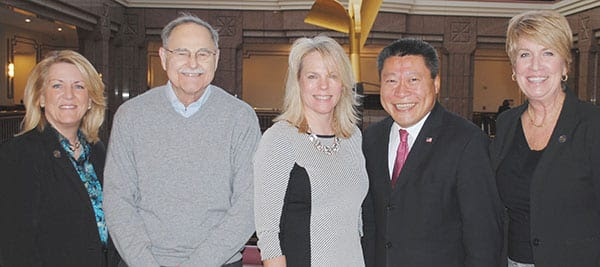
HARTFORD- Fairfield state legislators on Feb. 16 participated in a wide-ranging the discussion at the Legislative Office Building on the controversial 1990 affordable housing state law known as “8-30g”.
Housing Committee Chair Sen. Tony Hwang, Ranking Member Rep. Brenda Kupchick, and Rep. Laura Devlin said the public hearing was an opportunity to:
- Receive input from local zoning officials, community leaders and residents from impacted neighborhoods.
- Boost affordable and workforce housing stock for seniors, working families, and disabled residents.
- Develop innovative housing policies for urban, suburban and rural communities.
Rep. Brenda Kupchick, the ranking member of the Housing Committee said, “After years of attending town planning and zoning meetings, I've seen first-hand how this statute can be used to overbuild and override local zoning laws. We've been meeting with housing advocates, members of our local zoning officials to identify helpful changes. Massachusetts has a similar affordable housing statue that has been far more effective and isn't punitive. Thursday's public hearing was enlightening".
“While well-intended to increase affordable housing in our state when enacted in 1989, the Affordable Housing and Land Use Appeals Act, state statute 8-30g in fact is not working to achieve its intended goal. Current law has made it more difficult for municipalities to comply and offers an unfair advantage to developers,” said Rep. Laura Devlin. “The modifications brought forth in the proposals discussed today will help communities meet the goal of increasing affordable housing across Connecticut and address the unintended consequences that have resulted from this statute.”
Joining the lawmakers were the co-chairs of the Town of Fairfield Affordable Housing Committee: Robert Frigo and Cynthia Sammarco.
According to the both Mr. Frigo and Ms. Sammarco, the Affordable Housing Committee believes that 8-30g needs to be amended for several reasons. One primary reason is to address predatory practices by developers who use the existing regulations, not for the purpose of serving low-income families, but instead are motivated purely by profit, regardless of how their development may affect the neighborhood and the surrounding homes and for many residents, equity in these homes represents the bulk of their retirement savings.
- The public may email their comments about ways to improve the law to HSGtestimony@cga.ct.gov. (Comments may be as brief as you like. Include your name and town.)
- Put “Improve 8-30g” in the email’s subject line.
- Copy Tony.Hwang@cga.ct.gov, Brenda.Kupchick@cga.ct.gov and Laura.Devlin@cga.ct.gov
Thank you!
| Connect with Tony: |
| SenatorHwang.com | About Tony | Newsroom |
 |





No comments:
Post a Comment
Authors of comments and posts are solely responsible for their statements. Please email MiddletownInsider@gmail.com for questions or concerns. This blog, (and any site using the blogger platform), does not and cannot track the source of comments. While opinions and criticism are fine, they are subject to moderator discretion; slander and vile attacks of individuals will not to be tolerated. Middletown Insider retains the right to deny any post or comment without explanation.